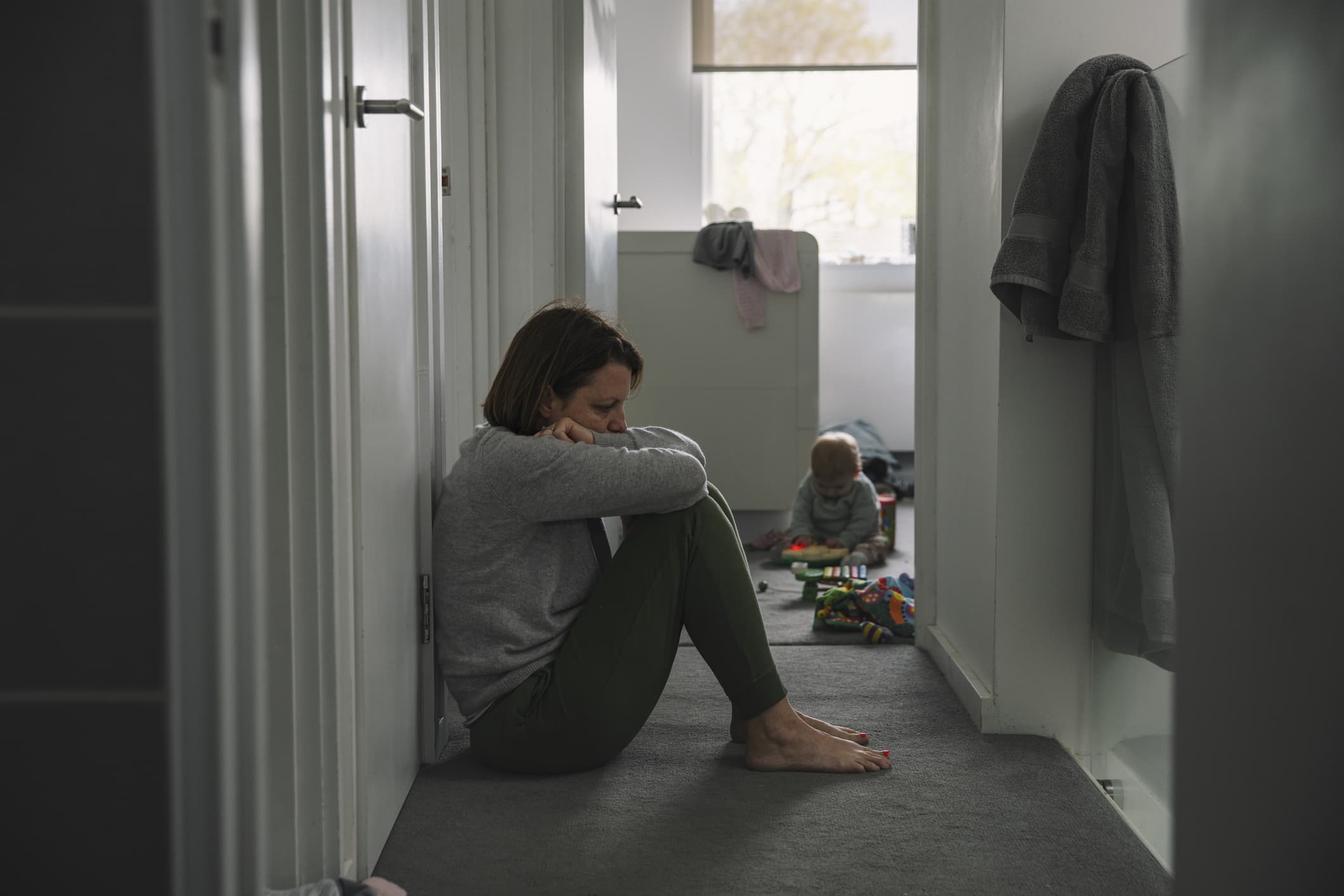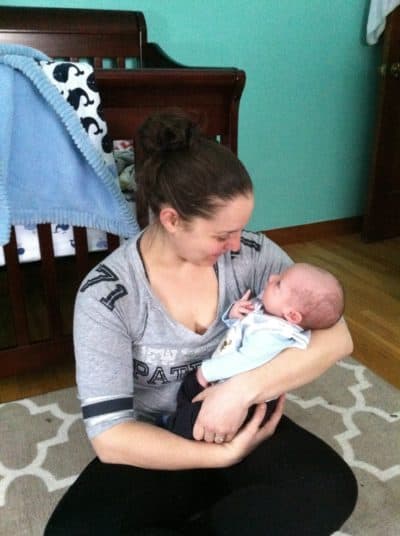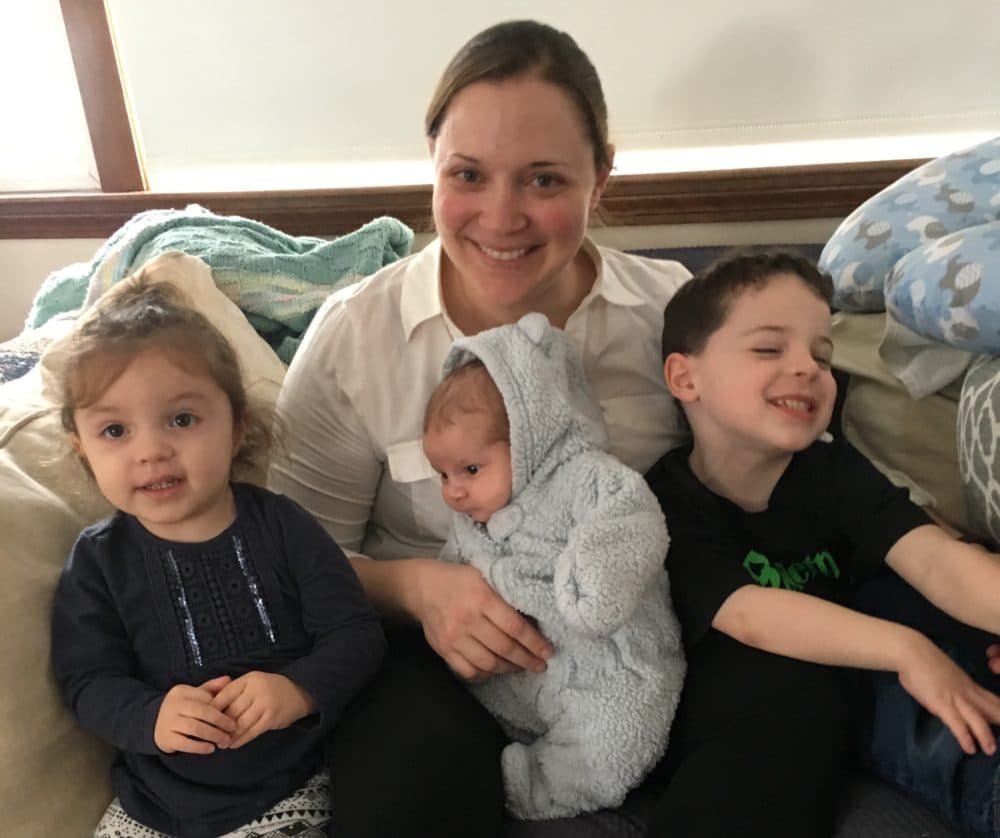
We are failing postpartum mothers — even though we know how to help them
No one told Ashley Healy that the deep sadness and loneliness she experienced after her first child was born was postpartum depression. Her birth experience in 2015 had been traumatic, including a rushed induction, intense pain after delivery and postpartum hemorrhage. No one at the hospital mentioned that her experience increased her risk of developing a mood and anxiety disorder.

Three years later, Healy was 38 weeks pregnant with her third child and in a car on her way to her brother’s wedding in New Jersey, her medical records in hand. She had requested them, in case she went into labor on the way.
“I was reading the medical records from the OB’s office, and there it was,” she told me, a diagnosis of postpartum depression. “They never referred me for treatment or therapy — nothing.” The diagnosis meant that she was more likely to experience postpartum depression again. Yet, there she was, on the cusp of delivery, and no one had mentioned it.
Talk to parents of young children enough and you realize stories like Healy’s, of ignored warning signs and deferred mental health care, are not uncommon. In fact, they are practically the norm.
I spent more than three years studying the science of the parental brain and interviewing researchers and parents about the profound neurobiological upheaval that occurs during pregnancy and in the immediate weeks and months after birth. These changes in the brain help a person adapt to new parenthood and also make them vulnerable to mental illness.
“They never referred me for treatment or therapy -- nothing.”
Ashley Healy
Those conversations confirmed what I felt to be true after the birth of my own son in 2015 left me feeling blindsided: Not only do we often deny people the knowledge that new parenthood is a distinct stage of development, but the United States systematically ignores this fact in the design and delivery of health care, and many parents struggle as a result.
For the better part of two decades, health care reform has been focused on preventive care. Doctors, hospitals, insurers and policymakers look “upstream,” as they say, for ways to head off the most expensive and debilitating health conditions.
The number of people affected by postpartum mood and anxiety disorders is probably higher than you think: the data suggest perhaps between 1 in 5 or 7 people. Yet, even as awareness of postpartum depression in particular has grown, there’s been relatively little movement toward prevention of this particularly expensive and often debilitating health condition.
Mental health conditions, including suicide and substance use, are the most common underlying cause of U.S. maternal deaths during pregnancy or in the first year postpartum. The number of these fatalities is rising and far outpaces rates in other high-income countries. And Black women are three times as likely as white women to die from a pregnancy-related cause.
It’s almost as if we accept postpartum depression as an inevitable outcome.
We know that adequate paid time off after having a baby is essential health care — proven to protect maternal mental health — but we’ve failed again and again to create a federally mandated paid parental leave program.
Most new parents in the United States also receive dramatically less clinical care in the early postpartum period — one standard appointment, six weeks out — than they do in our peer countries, where public nurses and midwives make repeated home visits. In fact, the overall trend in rural counties across the U.S. is outright closure of hospital maternity units and a decline in access to obstetricians, who are often the first provider a struggling new parent may go to for help.
It’s almost as if we accept postpartum depression as an inevitable outcome. We drop new parents in the stream, with a promise to catch them — if we can.
These issues may be top of mind recently, because we pay more attention when tragedy strikes — as it did in Duxbury, Mass. where Lindsay Clancy, 32, is accused of strangling her three children before she jumped from a second-floor window in an apparent suicide attempt. We’re now asking, “how did this happen?”
The Duxbury case is extreme and gut-wrenching, and there’s so much we don’t know. Clancy’s lawyer has said she was suffering from postpartum depression and possibly psychosis, a rare and serious illness occurring after 1 or 2 of every 1,000 births.
What we do know is that, while there is an incredible web of care providers and community support groups trying to fill the gaps, the standard of mental care for so many new parents is far too little, and even approaches abject neglect.
It’s a big problem that will require a complex response, but it’s not without solutions. Some are right in front of us.
In 2016, the U.S. Preventive Services Task Force recommended that all pregnant and postpartum people be screened for depression. The task force is a volunteer panel of physicians created by Congress to make evidence-based recommendations for preventive care, and their decisions influence what insurers are required to cover under the Affordable Care Act. Here, finally, was a long-fought-for acknowledgment of just how common depression is during and after pregnancy, and of the importance of good care for those experiencing it. Patient advocates and health care providers rightly celebrated.
The same task force made a related recommendation three years later, in 2019, before the pandemic, this time aimed at preventing postpartum depression — before a person is in crisis.
The panel advised that doctors should screen pregnant people for risk factors, including a history of depression or abuse, an unwanted or unplanned pregnancy, pregnancy complications, or major life stressors, including financial stress. The task force said those with elevated risk should be referred to counseling, which studies have found to be effective at preventing serious symptoms from developing.
The recommendation meant that most insurers would be required to cover this preventive care — the screening and the therapy — under the Affordable Care Act, with no out-of-pocket cost to patients.
But this time, the recommendation went virtually unnoticed.
“We know that the peripartum time is a vulnerable time,” said Dr. Carol Mangione, chair of the task force and chief of the division of general internal medicine and health services research at UCLA. “In the COVID era, if anything, we should be considering this and implementing this even more, in order to ensure that new parents are getting the support they need to thrive.”
That hasn’t happened.
Insurers generally don’t advertise preventive psychotherapy for pregnant or postpartum people as a covered service. The American College of Obstetricians and Gynecologists has not issued any guidance on implementing the recommendation. Many providers and advocates I’ve asked, did not know that it had been issued at all.
Why?
Put most cynically: It seems cheaper, on paper, to let new parents struggle in silence.
One reason: Compared with preventive care like cancer screenings, it’s harder for health insurers to quantify the savings created by prevention of postpartum depression — to put a figure on what is saved and justify the investment in up-front care. Put most cynically: It seems cheaper, on paper, to let new parents struggle in silence.
Then there is the shortage of mental health providers nationwide, and especially those with perinatal expertise. It’s a problem driven by the mismatch between the high cost of training and relatively low payment for the care they provide.
Strong Roots Counseling in Newton specializes in perinatal emotional complications and accepts most commercial insurances. Even with nine therapists, the demand is overwhelming, said therapist and owner Mara Acel-Green.

“We've had to cap our waitlist routinely over the last three years because we just can't accommodate the need,” Acel-Green said. “I feel like I'm drinking from a firehose on a good day.”
The need isn’t only for more providers but for more diverse providers, including those who can give the most relevant care to Black and brown families or to people who speak languages other than English. That’s a need the Massachusetts Moms Matter Act, introduced at the State House, could help address, directing money to programs that train and employ those providers.
Services like Maven Clinic, a virtual health clinic focused on reproductive care and family health, could be another path to better care.
Maven created a short questionnaire to screen patients for social needs during the perinatal period, including food and housing security, employment, social isolation or intimate partner violence. In a survey of 215 people, 78% reported at least one unmet social need.
Dr. Neel Shah, Maven’s chief medical officer, told me that once the care team saw those results, they added the questionnaire to Maven’s screening for all new patients, so that even those who aren’t expressing depression or anxiety symptoms can receive additional follow-up, including by mental health providers or social workers.
Shah’s reflection points to a bigger obstacle — one harder to tackle with a piece of legislation or standard questionnaire. The societal message to pregnant people, he said, is different from patients in just about any other health care context. So often it’s, “deal with it.”
I would take that one step further and say, the message is that pregnant people can deal with it.
In reality, struggle is an inherent part of the process of becoming a parent. But suffering in that struggle shouldn’t be.
There is a flawed narrative of pregnancy and parenthood that allows policymakers and health care executives to avoid doing more, to avoid implementing real care for birthing parents. That narrative tells us that women were born to have babies and, therefore, any struggle they experience along the way is simply deviation from the norm — faulty wiring.
In reality, struggle is an inherent part of the process of becoming a parent. But suffering in that struggle shouldn’t be.
“Maven can do a lot better than we're doing today. The industry can do a lot better,” Shah said. “And what will help with both is if society raises the bar on what we believe people deserve.”
We must raise the bar, because where we are now, way downstream — we are drowning.

After Healy’s third child was born, she suffered from depression again, starting around five weeks postpartum. “I'd get so incredibly angry. It was like this visceral feeling that I had to get away from either the baby or my other two,” she said. “It was so alarming, and I just knew it wasn't right.”
This time, Healy knew enough to ignore the postpartum screening result that put her in the normal range for mood-related symptoms. She stopped her provider from rushing through the six-week checkup without asking about her mental health.
This time, she got help, because she knew to ask for it.
